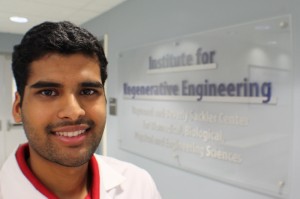
The Fabrication of Drug Encapsulated Microparticles for the Purpose of Drug Delivery for Pain Management
August 2014 – August 2015
Department of Orthopaedic Surgery, Institute of Regenerative Engineering, UConn Health
Osteoarthritis (OA) is caused by the breakdown of cartilage. The deterioration of cartilage directly exposes joints to bone surfaces causing excruciating pain, decreased range of motion, and other forms of disability to patients. To combat the pain, oral non-steroidal anti-inflammatory drugs (NSAIDS) and intra-articular injections are used to manage pain from 24 hours to 7 days. However, both NSAIDS and intra-articular injections clear out of the system rapidly and require repeated dosages (leading to infection and excessive drug concentration at target site).
The purpose of this project is to develop a biodegradable microparticle (MP) implants for long lasting delivery of the NSAID celecoxib (CLX) for effective pain management of OA. Five different co-polymers of PLLA and PCL such as PLLA, Poly (LA-co-CL)(95:05), Poly (LA-co-CL)(85:15), Poly (LA-co-CL)(80:20), and Poly (LA-co-CL)(70:30) were used to fabricate MPs and release profiles were evaluated in vitro. The microparticles were fabricated by an oil-in-water emulsification technique followed by a solvent evaporation process. The drug loading efficiencies were determined using an extraction technique. The microparticles were characterized using FT-IR and light microscope.